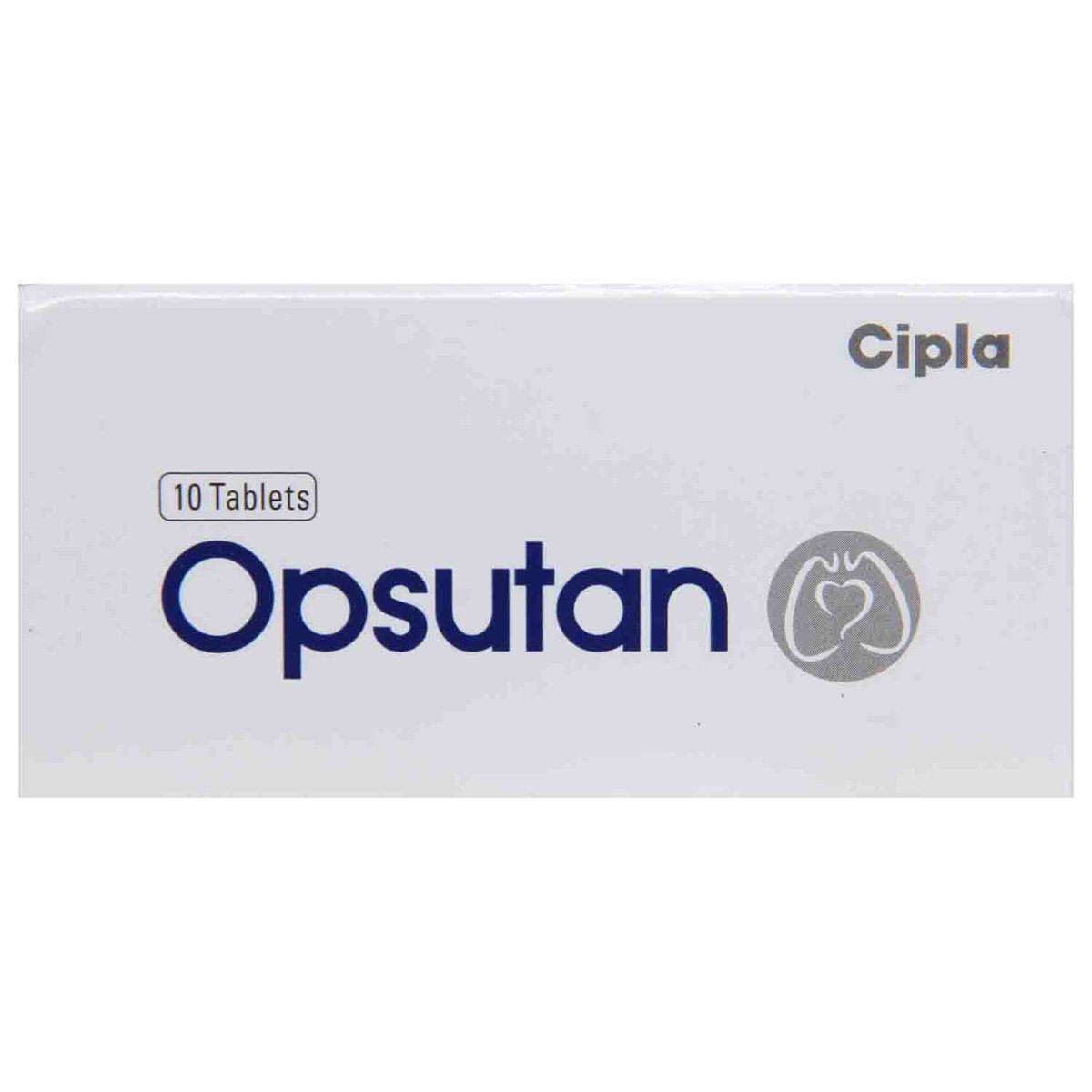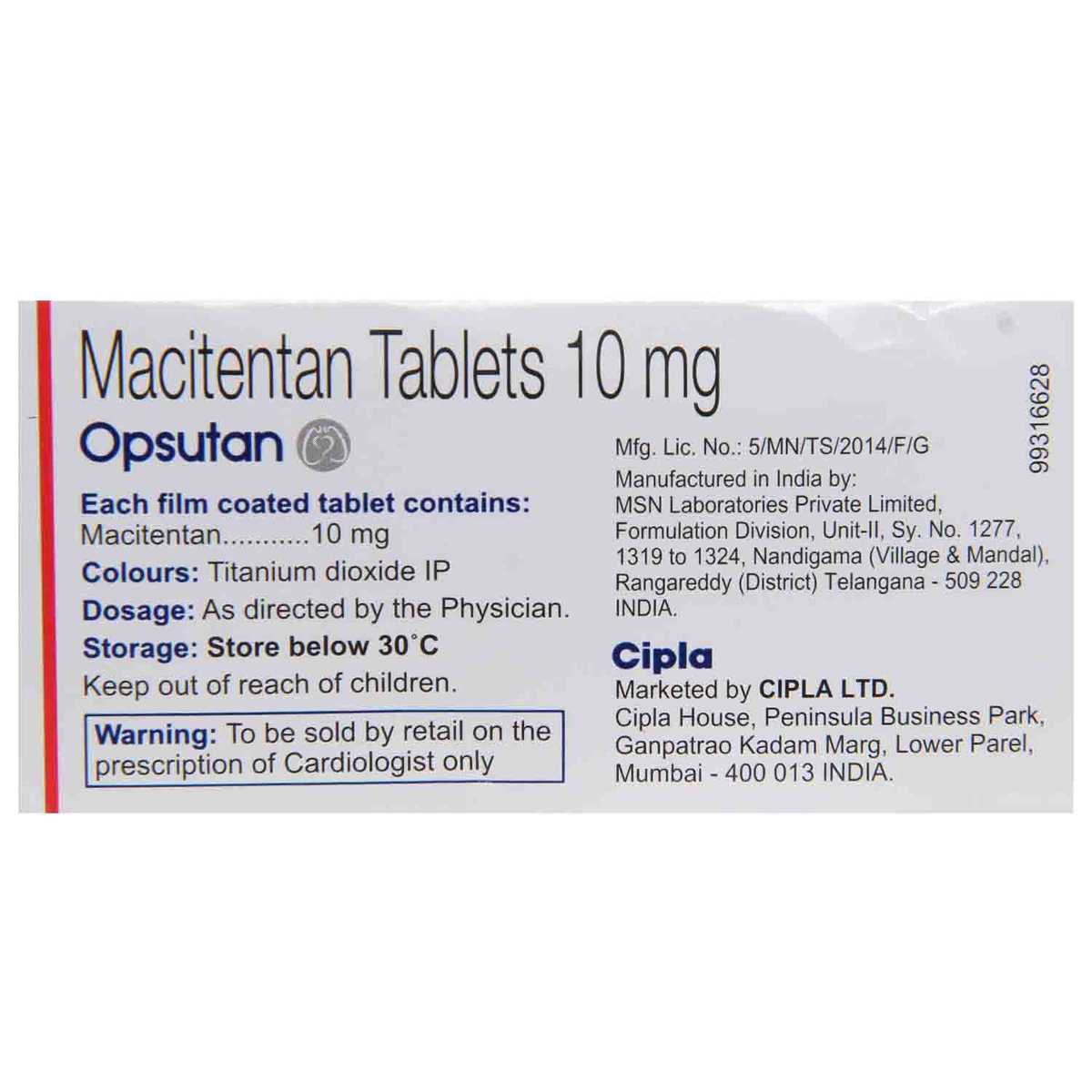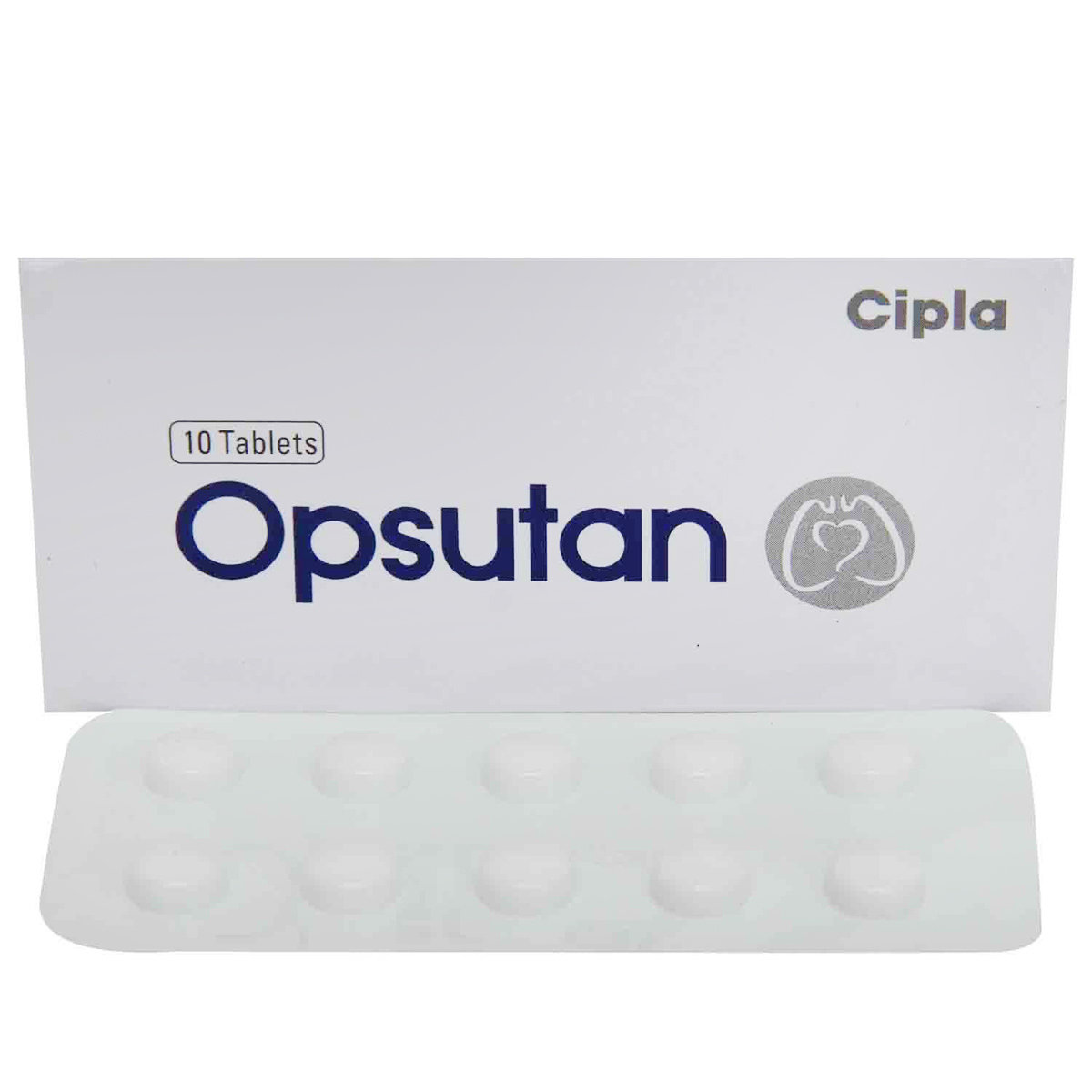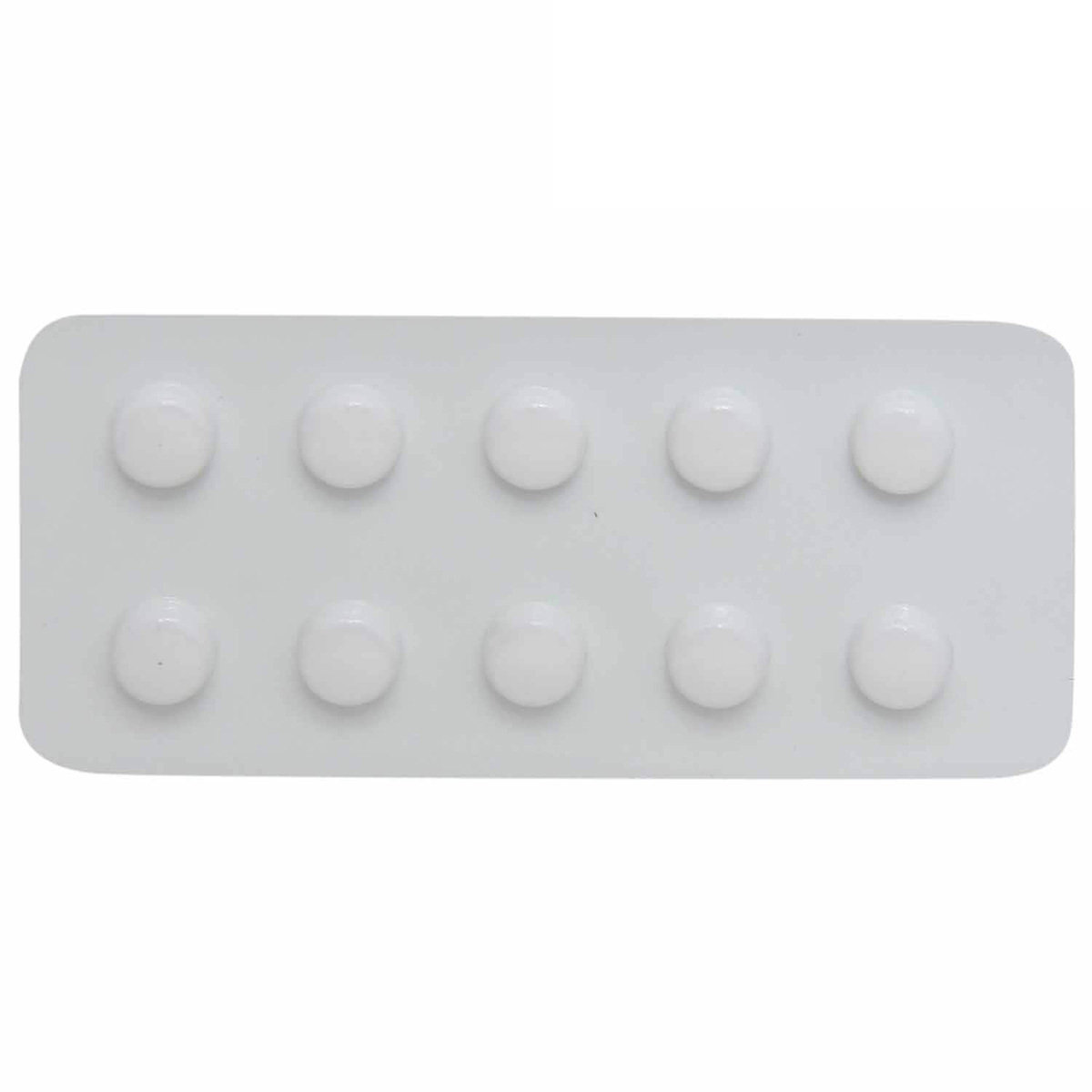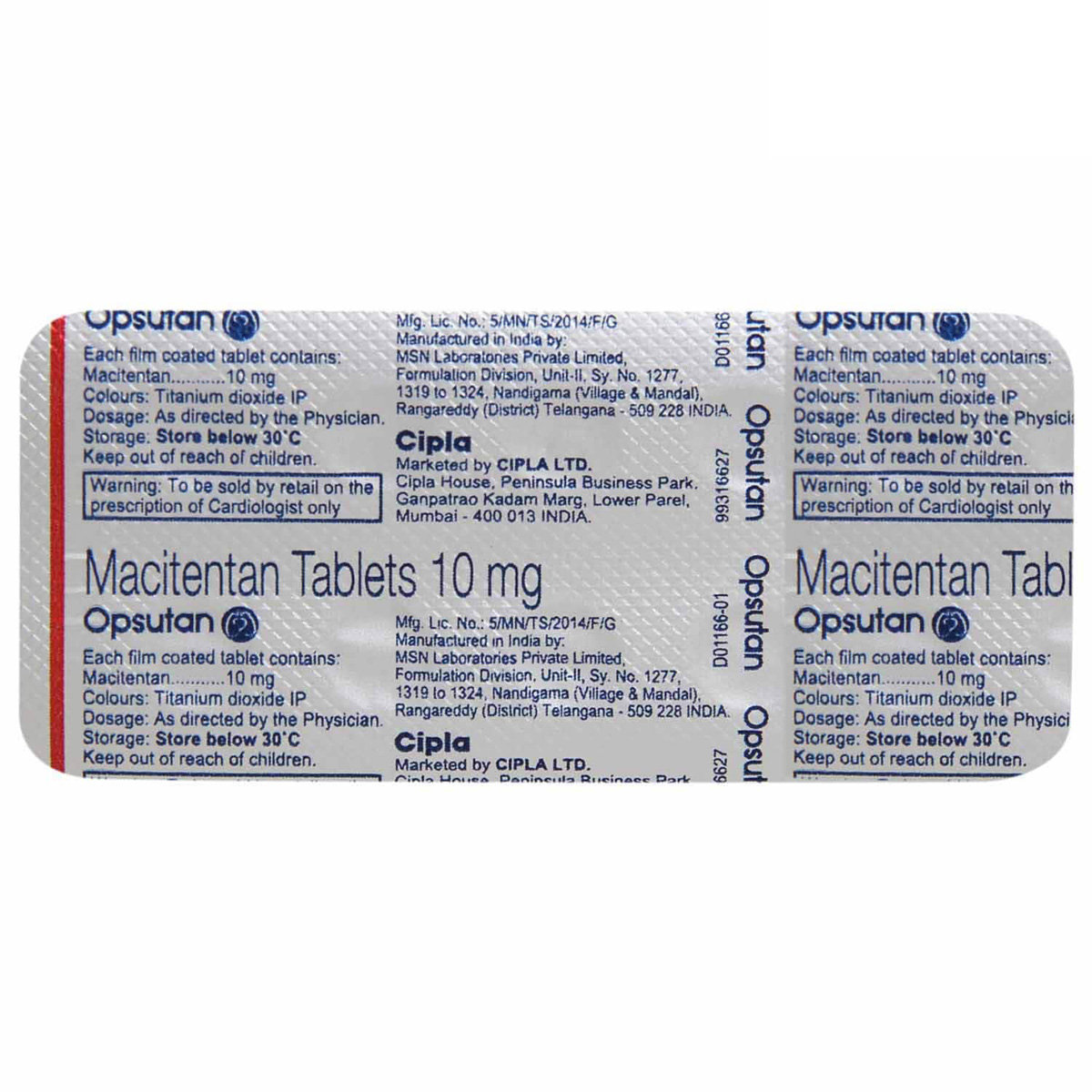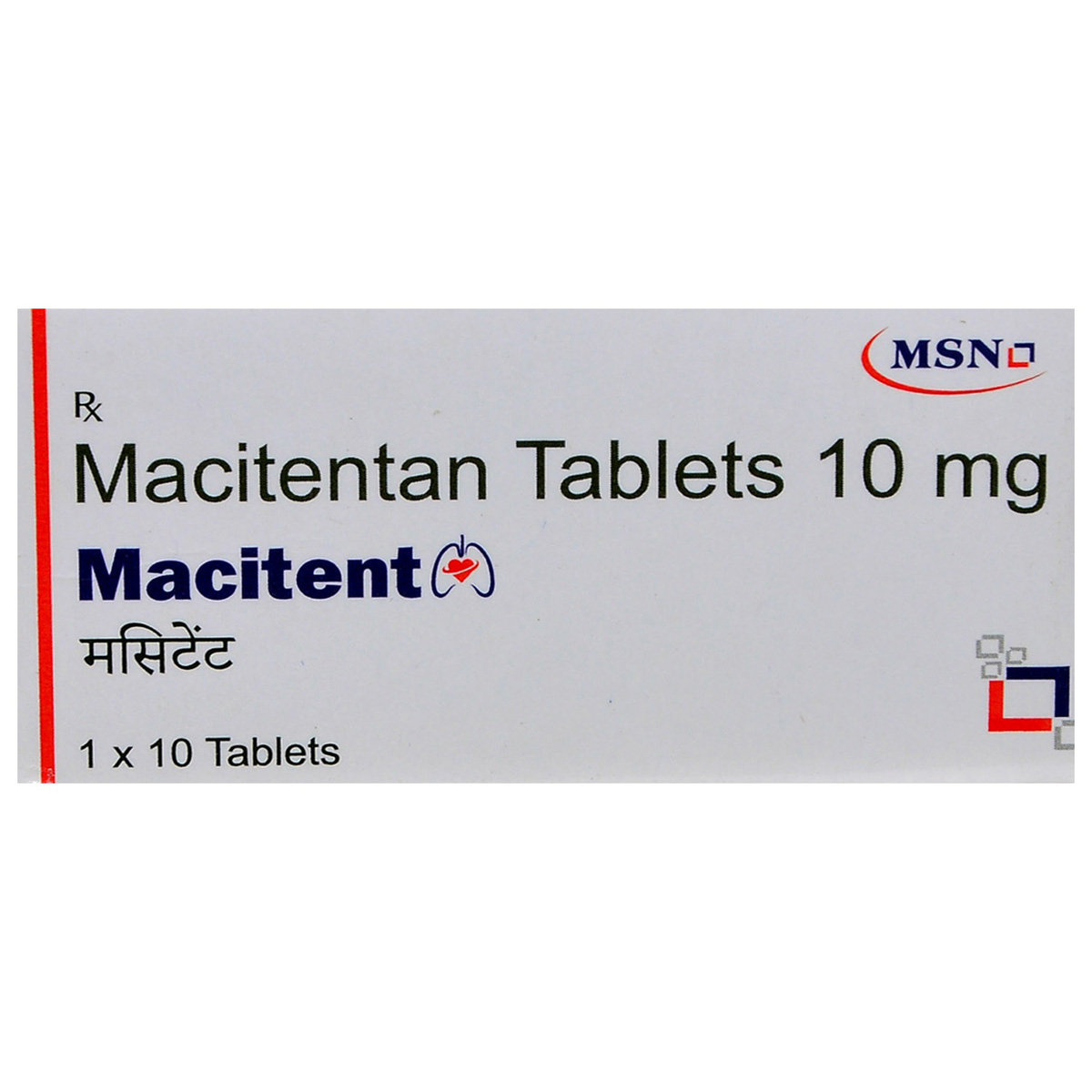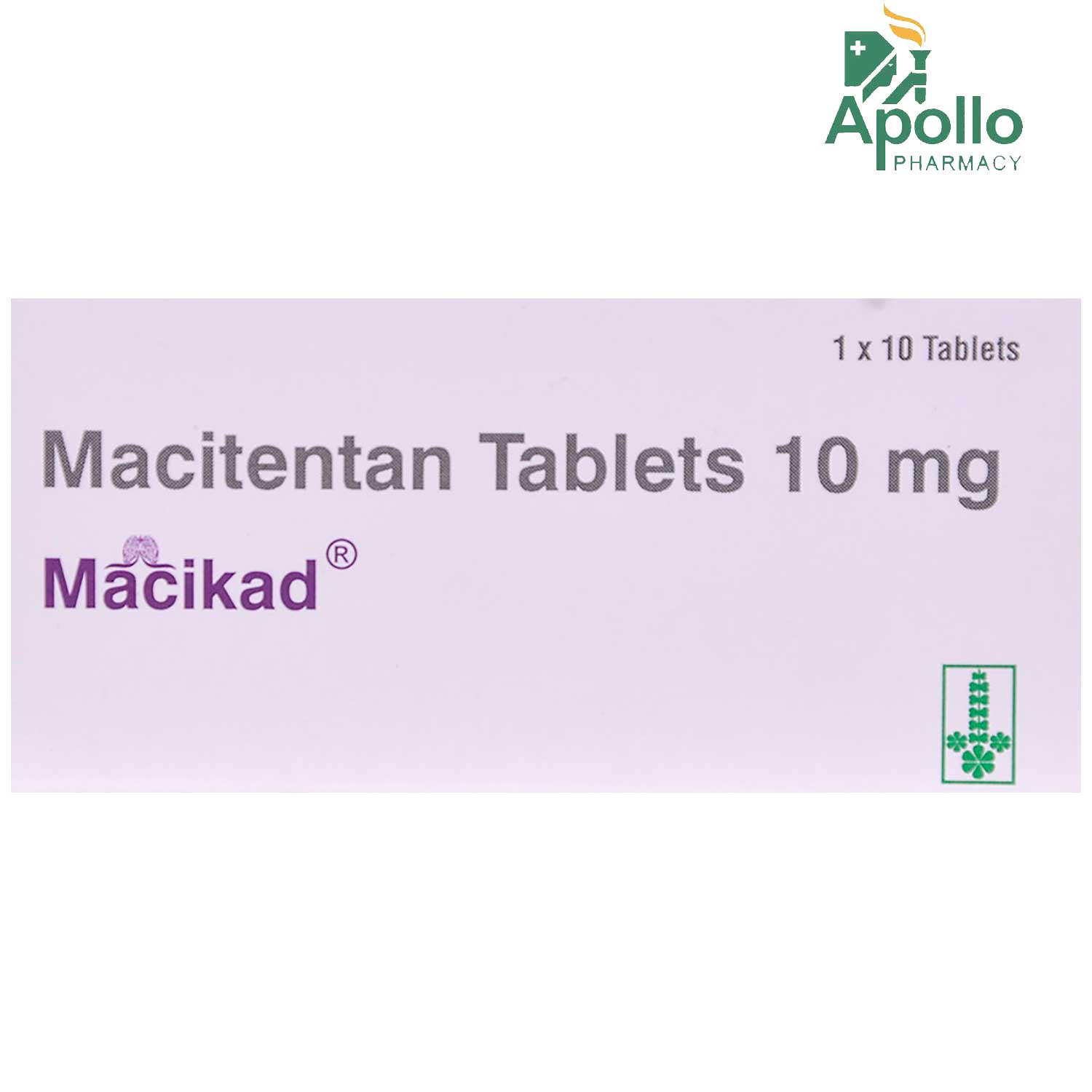Opsutan Tablet 10's
MRP ₹2084
(Inclusive of all Taxes)
₹312.6 Cashback (15%)
Provide Delivery Location
Online payment accepted
 Prescription drug
Prescription drugWhats That
Composition :
Manufacturer/Marketer :
Consume Type :
Expires on or after :
Return Policy :
About Opsutan Tablet
Opsutan Tablet belongs to the class of 'anti-hypertensive drugs', primarily used to treat high blood pressure in the lungs' arteries (pulmonary arterial hypertension). Hypertension is a medical condition in which the blood exerts high pressure (force exerted by circulating blood) against the walls of blood vessels. This condition makes the heart work harder in pumping blood to the whole body. Pulmonary hypertension affects arteries in the lungs and the right side of the heart.
Opsutan Tablet contains 'macitentan', which works by inhibiting the action of Endothelin, a natural substance that constricts blood vessels and raises blood pressure. Opsutan Tablet widens the constricted pulmonary arteries (blood vessels that carry blood from the heart to the lungs) and increases blood supply, thus lowering blood pressure.
Take Opsutan Tablet as prescribed by your doctor. Your dose and duration of Opsutan Tablet will be advised by your doctor, depending upon your medical condition. In some cases, you may experience headaches, inflammation of the airways, and oedema. Most of these side effects of Opsutan Tablet do not require medical attention and gradually resolve over time. However, if the side effects persist, please consult your doctor.
Please inform your doctor if you are using any prescription, or non-prescription drugs, including vitamins and herbal products. Before starting Opsutan Tablet , let your doctor know if you have allergic reactions to Opsutan Tablet or other medicines. Inform your doctor if you have low blood pressure, lung, heart, kidney, liver problems, and anaemia (lack of blood cells). It is advised to consult a doctor if you are a pregnant or breastfeeding mother. Do not stop taking Opsutan Tablet without consulting your doctor since it may worsen your condition and increase the risk of future heart problems. Do not consume alcohol with Opsutan Tablet as it may increase the risk of low blood pressure.
Uses of Opsutan Tablet
Directions for Use
Key Benefits
Opsutan Tablet is an anti-hypertensive medicine that treats high blood pressure in the lungs' arteries (pulmonary arterial hypertension (PAH)). It contains 'Macitentan,' which works by inhibiting the action of Endothelin, a natural substance that constricts blood vessels and raises blood pressure. In people with PAH, the pulmonary arteries get narrower making the heart work harder to pump blood through them. Opsutan Tablet widens these constricted arteries and makes it easier for the heart to pump blood, thus lowering the blood pressure.
Storage
- Using a cold compress may help relieve itching and inflammation associated with conjunctivitis.
- A warm compress and washing the eyes with water can help with crusting on the eyelids.
- Avoid wearing contact lens until you feel better; use spectacles instead.
- Do not rub the eyes.
- Practise good hand hygiene and avoid touching the eyes to prevent the spread of infection.
- Drink water or other clear fluids.
- To prevent worsening of pain, limit intake of tea, coffee, or alcohol.
- Include bland foods like rice, toast, crackers, and rice in your diet.
- Avoid lying down immediately after eating as it may cause indigestion or heartburn.
- Avoid acidic and spicy food as it may cause indigestion.
- Increase fibre intake to alleviate constipation.
- Track your food intake to identify trigger foods.
- Limit caffeine, fatty foods, and gas-producing foods.
- Explore probiotics or a low fermented sugar diet for relief.
- Regular exercise and stress management through therapy can help.
- Stay hydrated by drinking plenty of water.
- Your doctor may recommend medications to dissolve the small gallstones (like ursodiol) or use shock waves to break up the stones.
- Try to eat regular meals because skipping meals can increase the risk of gallstones by making your gallbladder work less efficiently.
- Eat breakfast soon after you wake up, as cholesterol in bile is highest in the morning.
- If you are overweight, losing weight gradually can help lower the chance of developing gallstones.
- Include plenty of fresh vegetables and fruits in your diet.
- Base your meals around starchy foods like bread, pasta, rice, and potatoes, especially whole grain or high-fibre varieties.
- If you experience symptoms like difficulty breathing, stridor (high-pitched whistling sound when breathing), high fever or chest pain, consult a doctor immediately.
- Use a nebulizer or a cool-mist humidifier to help loosen mucus and soothe inflamed airway.
- Drink lots of water to thin mucus and help with coughing.
- Get enough sleep to allow the body to heal.
- Suck on lozenges to soothe sore throat.
- Quit smoking and alcohol consumption.
Drug Warnings
Please inform your doctor beforehand if you are allergic to Opsutan Tablet or other medicines. Brief your medical history if you have heart failure, liver or kidney diseases, lung conditions (pulmonary fibrosis), anaemia, oedema (fluid retention) and hypotension (low blood pressure) before starting Opsutan Tablet . Opsutan Tablet is contraindicated during pregnancy since it harms the foetus. Please get a pregnancy test done before starting Opsutan Tablet . You should get a negative pregnancy test for sure before using Opsutan Tablet . Also, please use reliable forms of birth control if you are undergoing treatment with Opsutan Tablet to avoid pregnancy. Consult your doctor before using Opsutan Tablet if you are a breastfeeding mother. Complete the course strictly as the doctor advises, even if you feel better, to avoid the recurrence of the disease. Do not drive or operate machinery since Opsutan Tablet may cause side effects like dizziness and weakness, affecting your ability to concentrate and drive. Avoid consumption of alcohol with Opsutan Tablet as it may increase the risk of low blood pressure. Opsutan Tablet is not recommended in patients younger than 18 years of age.
Drug-Drug Interactions
Drug-Drug Interactions
Login/Sign Up
Taking Opsutan Tablet with Fosamprenavir may increase the blood levels of Opsutan Tablet, which increases severe side effects.
How to manage the interaction:
Co-administration of Opsutan Tablet with Fosamprenavir can possibly result in an interaction, but it can be taken if your doctor has advised it. If you're having any of these symptoms like fever, chills, joint pain or swelling, unusual bleeding or bruising, skin rash, itching, loss of appetite, fatigue, nausea, vomiting, abdominal pain, dark colored urine, light colored stools, and/or yellowing of the skin or eyes, it's important to let your doctor know. Do not stop using any medications without first talking to your doctor.
Taking Opsutan Tablet with Primidone may significantly reduce the blood levels of Opsutan Tablet, which may make the medication less effective.
How to manage the interaction:
Co-administration of Primidone with Opsutan Tablet can possibly result in an interaction, it can be taken if prescribed by a doctor. However, if you experience any unusual symptoms, contact a doctor immediately. Do not discontinue any medications without consulting a doctor.
Taking Opsutan Tablet with Troleandomycin may increase the blood levels of Opsutan Tablet, which increases severe side effects.
How to manage the interaction:
Taking Opsutan Tablet with Troleandomycin together can possibly result in an interaction, but it can be taken if your doctor has advised it. If you're having any of these symptoms like fever, chills, joint pain or swelling, unusual bleeding or bruising, skin rash, itching, loss of appetite, fatigue, nausea, vomiting, abdominal pain, dark colored urine, light colored stools, and/or yellowing of the skin or eyes contact your doctor immediately. Do not stop using any medications without first talking to your doctor.
Taking Opsutan Tablet with Ketoconazole may increase the blood levels of Opsutan Tablet, which increases severe side effects.
How to manage the interaction:
Although taking Ketoconazole and Opsutan Tablet together can cause an interaction, it can be taken if a doctor has suggested it. If you're having any of these symptoms like fever, chills, joint pain or swelling, unusual bleeding or bruising, skin rash, itching, loss of appetite, fatigue, nausea, vomiting, abdominal pain, dark colored urine, light colored stools, and/or yellowing of the skin or eyes contact a doctor immediately. Do not stop using any medications without talking to a doctor.
Taking leflunomide with Opsutan Tablet affects the liver and may increase the risk of liver problems.
How to manage the interaction:
Although taking Leflunomide and Opsutan Tablet together can evidently cause an interaction, it can be taken if your doctor has suggested it. However, consult the doctor immediately if you experience symptoms such as fever, chills, joint pain or swelling, unusual bleeding or bruising, skin rash, itching, loss of appetite, fatigue, nausea, vomiting, abdominal pain, dark colored urine, light colored stools, and/or yellowing of the skin or eyes. Do not discontinue any medications without consulting a doctor.
Taking Enzalutamide with Opsutan Tablet may decrease the blood levels of Opsutan Tablet, which may make Opsutan Tablet less effective in treating your condition.
How to manage the interaction:
Although taking Enzalutamide and Opsutan Tablet together can possibly result in an interaction, it can be taken if your doctor has prescribed it. However, if you experience any symptoms like- watery eyes, a runny nose, sneezing, yawning, sweating heavily, fever, chills, flushing, restlessness, irritability, anxiety, eye problems, shaking, rapid heartbeat, body aches, involuntary twitching and kicking, stomach pain, diarrhea, consult the doctor. Do not discontinue any medications without a doctor's advice.
Taking Opsutan Tablet with itraconazole may increase the blood levels of Opsutan Tablet that increases risk of side effects.
How to manage the interaction:
Itraconazole and Opsutan Tablet may interact, but if a doctor prescribes them, you can still take them. If you have a fever, chills, joint pain or swelling, unusual bleeding or bruising, skin rash, itching, tiredness, nausea, vomiting, abdominal pain, dark urine, light stools, or yellowing of the skin or eyes, seek medical attention. Never discontinue taking a medication without consulting a doctor.
Taking Opsutan Tablet with Ritonavir may increase the blood levels of Opsutan Tablet.
How to manage the interaction:
There may be a possibility of interaction between Opsutan Tablet and Ritonavir, but it can be taken if prescribed by a doctor. However, if you experience fever, chills, joint pain or swelling, unusual bleeding or bruising, skin rash, itching, loss of hunger, tiredness, nausea, vomiting, abdominal pain, dark colored urine, light colored stools, or yellowing of the skin or eyes, contact your doctor immediately. Do not stop using any medications without talking to a doctor.
Taking Opsutan Tablet with Indinavir may increase the blood levels of Opsutan Tablet, which increases severe side effects.
How to manage the interaction:
Taking Opsutan Tablet with Indinavir together can possibly result in an interaction, but it can be taken together if your doctor has advised it. However, if you experience fever, chills, joint pain or swelling, unusual bleeding or bruising, skin rash, itching, loss of appetite, fatigue, nausea, vomiting, abdominal pain, dark colored urine, light colored stools, and/or yellowing of the skin or eyes, contact your doctor immediately. Do not stop using any medications without first talking to your doctor.
Taking Opsutan Tablet with Boceprevir may increase the blood levels of Opsutan Tablet, which increases severe side effects.
How to manage the interaction:
Although taking Opsutan Tablet and Boceprevir together can evidently cause an interaction, it can be taken if your doctor has suggested it. However, if you experience fever, chills, joint pain or swelling, unusual bleeding or bruising, skin rash, itching, loss of appetite, fatigue, nausea, vomiting, abdominal pain, dark colored urine, light colored stools, and/or yellowing of the skin or eyes, it's important to let your doctor know. Do not stop using any medications without first talking to your doctor.
Drug-Food Interactions
Drug-Food Interactions
Login/Sign Up
Diet & Lifestyle Advise
- Maintain a diet that includes vegetables, fruits, whole grains, legumes, omega-3-rich foods, and lean protein sources.
- Keep your weight under control with a BMI of 19.5-24.9.
- Avoid chronic stress as it can raise your blood pressure. Try to enjoy and spent time with your loved ones to cope with stress and practice mindfulness techniques.
- Try to include heart-healthy omega-3-fatty acids containing food drinks in your daily diet. You can also use low-fat cooking oil like olive oil, soybean oil, canola oil and coconut oil to lower your elevated blood pressure.
- Be mindful of salt; consume no more than 2,300 mg each day.
- Limit or avoid alcohol consumption.
- Quitting smoking is the best strategy to lower the risk of heart disease.
Side Effects of Opsutan Tablet
- Anaemia (low number of red blood cells) or reduced haemoglobin
- Headache
- Bronchitis (inflammation of the airways)
- Nasopharyngitis (inflammation of the throat and nasal passages)
- Oedema (swelling), especially of the ankles and feet
Habit Forming
Therapeutic Class
All Substitutes & Brand Comparisons
RX
Out of StockMacirol Tablet 10's
Consern Pharma Ltd
₹1750
(₹157.5 per unit)
16% CHEAPERRX
Macitent Tablet 10's
Msn Laboratories Pvt Ltd
₹2175.5
(₹195.8 per unit)
4% COSTLIERRX
Macikad Tablet 10's
Lupin Ltd
₹2291.5
(₹206.24 per unit)
9% COSTLIER
Author Details
We provide you with authentic, trustworthy and relevant information
Drug-Diseases Interactions
Drug-Diseases Interactions
Login/Sign Up
FAQs
Drug-Drug Interactions Checker List
- RIFAMPICIN
- CLARITHROMYCIN
- PHENYTOIN
- CARBAMAZEPINE
- RITONAVIR
- SAQUINAVIR
- FLUCONAZOLE
- ITRACONAZOLE
- CYCLOSPORINE
- DILTIAZEM
- VERAPAMIL
Special Advise
- Keep a check on your daily blood pressure, and if you notice any fluctuations, please consult a doctor.
- Your doctor may ask you to undergo a blood test whether you have anaemia (a reduced number of red blood cells).
- If you have diabetes, using Opsutan Tablet may affect your blood sugar levels. Inform your doctor so that you may adjust your diabetes medication accordingly.
- Your dietician may prescribe you a suitable exercise program and diet to manage your blood pressure.
- Your doctor may also suggest liver function tests.
Disease/Condition Glossary
Pulmonary Arterial Hypertension: It is referred to as high blood pressure in the blood vessels (the pulmonary arteries) that carry blood from the heart to the lungs. It's a serious condition that can harm the heart's right side. The walls of the pulmonary arteries thicken and stiffen, making it difficult for blood to flow through. Because of the reduced blood flow, the right side of the heart has a harder time pumping blood through the arteries which may lead to heart failure. The common symptoms of pulmonary hypertension are shortness of breath, dizziness, palpitations, and chest pressure. It can affect people of all ages, but it is more common in people who already have a heart or lung problem.

Have a query?
Alcohol
Safe if prescribed
It is advised to limit alcohol intake since alcohol consumption with Opsutan Tablet may increase the risk of low blood pressure and cause adverse effects, such as dizziness, fainting, light-headedness or headache.
Pregnancy
Consult your doctor
Opsutan Tablet is not recommended in pregnancy. It can affect and harm the developing baby. You are advised to get a pregnancy test done before starting Opsutan Tablet . You should get a negative pregnancy test for sure before using Opsutan Tablet . Also, please use reliable forms of birth control if you are undergoing treatment with Opsutan Tablet to avoid pregnancy.
Breast Feeding
Consult your doctor
Consult your doctor, and there is no substantial research yet on the use of Opsutan Tablet in breastfeeding/nursing mothers.
Driving
Safe if prescribed
Opsutan Tablet can cause side effects such as headaches and hypotension, and the symptoms of your condition can also make you less fit to drive.
Liver
Consult your doctor
Let your doctor know before taking Opsutan Tablet if you have any history of liver diseases or very high levels of liver enzymes in your blood. Your doctor will weigh the benefits and any potential risks before prescribing Opsutan Tablet .
Kidney
Consult your doctor
If you have kidney problems, talk to your doctor before using Opsutan Tablet . Macitentan may lead to more blood pressure reduction and a decrease in haemoglobin in patients with kidney problems. Please consult the doctor, and your doctor will weigh the benefits and any potential risks before prescribing Opsutan Tablet .
Children
Safe if prescribed
Safety and effectiveness of Opsutan Tablet have not been established in patients below 18 years of age.

